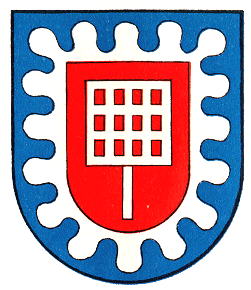Biesendorf: Difference between revisions
Knorrepoes (talk | contribs) m (Text replacement - "===Origin/meaning=== The" to "===Origin/meaning=== The") |
Knorrepoes (talk | contribs) m (Text replacement - "|center|Wappen von {{PAGENAME}}]] " to "|center|alt=Wappen von {{PAGENAME}} / Arms of {{PAGENAME}}]] ") |
||
| Line 7: | Line 7: | ||
Incorporated into : 1975 [[Engen]] | Incorporated into : 1975 [[Engen]] | ||
[[File:biesendo.jpg|center|Wappen von {{PAGENAME}}]] | [[File:biesendo.jpg|center|alt=Wappen von {{PAGENAME}} / Arms of {{PAGENAME}}]] | ||
{| class="wikitable" | {| class="wikitable" | ||
Revision as of 09:13, 16 August 2022
This page is part of the German heraldry portal Deutsche Wappensammlung |
Heraldry of the World |
|
German heraldry:
|
Selected collector's items from Germany:
|
BIESENDORF
State : Baden-Württemberg
District (Kreis) : Konstanz (until 1973 Tuttlingen)
Incorporated into : 1975 Engen
| German |
Von blau-silbernem Wolkenfeh-Schildrand umgeben, in Rot ein aufgerichteter silberner Rost mit Stiel. |
| English | No blazon/translation known. Please click here to send your (heraldic !) blazon or translation |
Origin/meaning
The arms were adopted in 1910.
The village historically belonged to the Hohenhewen Estate, which was part of the Principality of Fürstenberg. In 1806 it became part of Baden. The arms thus show the blue/white bordure of the Princes of Fürstenberg. The small shield with the silver grill refers to the patron saint of Biesendorf, St. Lawrence, whose attribute is the grill. The only historical seal of Biesendorf dates from the 19th century and only shows the name of the village.
Contact and Support
Partners:
Your logo here ?
Contact us
© since 1995, Heraldry of the World, Ralf Hartemink 
Index of the site












